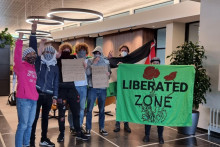Suppose there is a tragic car accident in the family. After the mourning, a discussion about the inheritance soon begins. The siblings argue about their share of the estate. One of the brothers feels he is entitled to the largest share. After all, he got along best with the deceased sister. This offends the others. Yet another sister thinks it's all right, as long as there is no fighting.
How do you get out of this predicament, and how do you keep everyone happy? This is one of the scenarios that the students of Great Negotiators reenacted, as this is what negotiating is about. ‘It sometimes led to strong emotions,' says UT student Snigdha Guntuka, who followed the Honours track. ‘Even though you know it's not real, we were all still angry at the brother. I mean, how can he be so selfish?’
At such occasions, it is important to understand the emotions that are evoked, says fellow student Rakshith Beligere Vedavyasachar. 'You have to know yourself well when negotiating. You have to understand why you are triggered by certain things. Some people are super assertive and others are very yielding. If you know that in advance, you can learn to deal with it. Furthermore, you learn to take your own prejudices into account.’
Great Negotiators consists of lectures and simulations of negotiations, combining theory and practice. The negotiations vary from business deals to international diplomacy, or, as described earlier, a family feud. ‘Negotiating is part of life', says Beligere Vedavyasachar. ‘Whether it is buying a new house or haggling at the market: everyone negotiates. That is why it is important to have certain tools at your disposal.’
These tools were provided during Great Negotiators by renowned negotiators such as Paul Meerts and Ida Manton who gave guest lectures to the students. ‘We also learned how to deal with different cultures during negotiations,’ Guntuka says. ‘In the track there were students from many different backgrounds. In some cultures it is customary to probe cautiously at first, while others come straight to the point. It is important to invest in your knowledge of the cultural differences before you start negotiating.'
The students will receive their diplomas on Friday during a plenary session. No doubt, it will be an interesting meeting: during their presentation, the students will compete against the lecturers of the Honours Programme.







